#Lancelot and Guinevere are about to start having an affair...
Explore tagged Tumblr posts
Text
Arthurian Legends | Dark Platonic King Arthur Pandragon x Daughter Reader x Dark Platonic Various
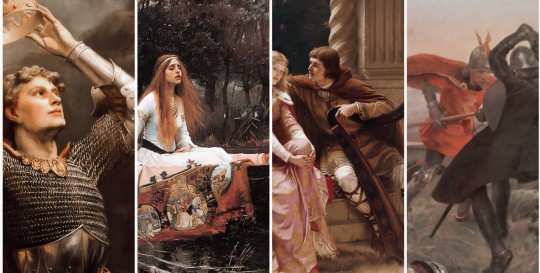
You are the twin of Mordred, and the child of King Arthur and Morgan Le Fay.
As you grew up, your mother mother shielded you, by placing protection spells on you, and also teaching you about healing using magic.
and she filled Mordred's head with hate on Arthur, claiming that he stole her birthright.
Mordred grew up with hatred in his heart towards Arthur, while you refused to hold ill intentions towards your father.
But that didn't stop you and Mordred from being inseparable and bonding as twins.
Whenever you have a suitor, Mordred gets rid of them with the help of his mother.
Morgan pushed you and your twin to reveal that you are his children at the court.
Mordred is quick to object on you coming with him, believing it to be dangerous.
"Mother, keep (Y/n) with you until I take revenge, I don't wish for her to meet the man who abandoned us and stole your throne"
"You and your sister have a connection, separation will only cause destruction"
You, on the other hand, did not want to ruin Arthur's marriage with Guinevere, yet you didn't wish to make your mother sad.
So, you started your journey with your twin.
Mordred made the first appearance by saving the king on a hunting trip, making Arthur knight him therefore he joins the Round Table.
Then Mordred introduces you to the court before announcing that the both of you are the children of the King
Arthur wanted to deny it even if he knew it was true, but when he saw how embarrassed you felt, he confirms it instead.
Later that day, you approach him and Guinevere shyly, stuttering out words of apology.
"I apologise for my brother's behavior and causing disturbance"
Your apology made Arthur obsessed with the idea of protecting you from any harm.
While Guinevere fall in love with the idea of you being her step-daughter.
She didn't have any children of her own, so you being her daughter is a really exciting thought.
Arthur makes sure to spend time with you bringing you on hunting trips with him and the knights of the round table.
He made you a tiara decorated with all types of rare stone gems for you to wear at all times.
Arthur would notice the closeness you have with Mordred which makes him decide to intask his son with many responsibilities so, you could spend more time with him instead of your twin.
"Your brother is occupied with his new responsibilities, allow to accompany you instead"
Merlin would grant you any wish you want, being more soft with you unlike how he is with Arthur when he was your age.
The old wizard also tries to advice your father to not keep you and your twin apart as it would might cause havoc.
But Arthur chose to ignore the warning, letting platonic obsession with you win.
On the other hand, Guinevere would take you with her on walks in the early morning.
Insisting you call her mother while she picks out expensive fabrics for the new dresses she ordered to be made for you.
"I wish for you to call me mother and to consider as such from now on"
"But, I have a mother, my queen"
"She is not here now, is she? I'm the wife of your father, so I'm your legitimate mother"
Mordred realizing that you are drafting away from him, your twin decided to cause chaos.
He exposed Guinevere in front of the whole court for having an affair with Lancelot, only to have his father cast her aside and order her death.
You try to reason with Arthur to spare her but seeing your love for her only made the king insistent on excuting.
The whole affair scandal caused a civil war.
Arthur decided to leave the kingdom and you in the care of Mordred while he went into war against Lancelot.
You helped Guinevere escape before she could get executed.
While Mordred seized the opportunity to ursurp the throne and become a king, allowing Morgan into the castle so all of you three could live together.
But you weren't pleased, taking a horse, you go to inform Arthur about what has occurred in his absence, making decide to return to reclaim the throne.
Thinking that Arthur has kidnapped and held you captive, Mordred almost went insane about how you, his twin, the other part of him, isn't by his side.
So, he went with an army to the battle of Camlann against Arthur's army.
The father and son stabbed each other severely, so both could die.
The end.
Actually, no, that's not the end.
Remember when your mother taught you about healing?
Well, it came to use, as you healed both Mordred and Arthur.
You made them both agree on peace, with Mordred returning the throne to your father, while Arthur forgives Mordred and open a new page.
Arthur banished Morgan, so she doesn't influence you and your twin ever again.
You, Arthur, and Mordred live in peace as a happy family.
A/n: I decided to give it a happy ending because I feel like it would be nice for a change.
#tw: toxic relationships#arthurian legend#reader insert#Yandere Arthur Pendragon#Yandere Mordred#yandere father#daughter reader#platonic yandere#arthur pendragon#Mordred#arthur pendragon x reader#Mordred x reader
642 notes
·
View notes
Note
Hands you an Agravaine (for the ask meme) :3
hi ram !!!! thank you for the ask! here's an agravaine for you <3
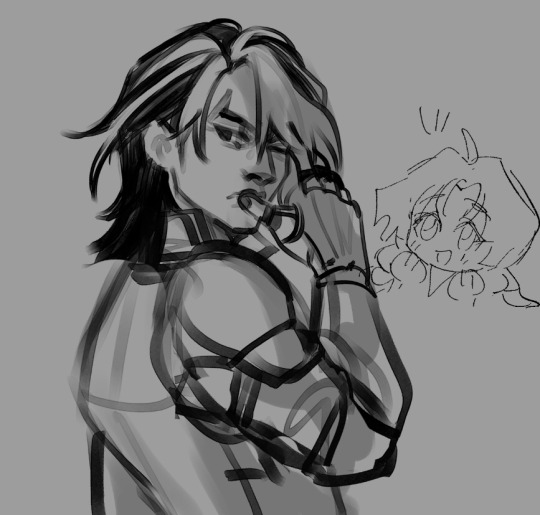
with a bonus laurel!
ask game under the cut
favorite thing about them
tbh i was pretty neutral on him until i started reading vulgate, he's so much more fleshed out and layered there (i started reading arthuriana with le morte d'arthur and he does fuck all there lol)
i think he's an incredibly compelling character, especially with his interpersonal relationships. there's just something about gawain having a younger brother named essentially not gawain and being a huge contrast to him, and i also really like his relationship with mordred in vulgate as an older brother who raised him. he's the kind of character who's wedged in between characters that are larger than him (i'm sorry agravaine but you're related to gawain, mordred, and arthur and being someone who's related to them is kinda your whole thing) and that in itself is interesting. especially considering that he dies during the fall of camelot, arthur mourns his death

vulgate, death of arthur
rereading this for this post put a tears in my eyes IT KILLS MEEEEEE. AGRAVAINE...... but yes tl;dr my favorite thing about him is being related to gawain/arthur/mordred and him dying. its sooo so so fun (not for them but its fun for ME)
least favorite thing about them
tbh, i find him to be severely underutilized (and if not, completely done dirty) i hate the characterization in which he's just mordred's lackey and there to pretty much die to lancelot and nothing else.
i think it would be way more impactful if he was fleshed out as a legit character. adds to the tragedy that he was somebody the audience actually cares for and not just some NPC lancelot murders lol.
also, really dislike how prose tristan stuff writes him (and the orkney brothers in general) where he's an irredeemable villain but i digress. it doesn't help that i don't care for the orkney/wales blood feud. it's never done in a way that resonates with me.
also the character assassination TH White has done to agravaine PISSES ME OFFFFFFFF ALL THE SHITTY AGRAVAINES IN MODERN ARTHURIANA IS HIS FAULT I SWEAR. aka making him morgause's killer throwing in some added incest in which he lusts for her. GROSS !!!! agravaine get behind me!!!!!
favorite line

tbh i could put anything that he says in mordred, a tragedy by henry newbolt but i really love this one in particular. talking about their brothers and that they're on mordred's side.... it brings a tear to my eye i love the orkneys so much. they're BROTHERS !!!!!!!!
brOTP
obviously him and his brothers! gawain and agravaine is great. so is mordred and agravaine. among his brothers those two i think he has the most interesting dynamic with. this post is already stupidly long and i could make an entire post in general about agravaine's relationship with his brothers, so i think i'll focus on agravaine and mordred.
for one, i love agravaine and mordred in BBC Legend of King Arthur 1979. the orkney brothers in general are great in it (minus gaheris bc he isn't there RIP) but i adore how it expounds on his dynamic with mordred AND his aunt morgan. mordred and morgan are both schemers with plots against arthur and guinevere, morgan wanting revenge on her father gorlois' death and mordred having (in later episodes) vying for the throne, agravaine on the other hand is a lot more sincere and earnest. he had no ulterior motives and his undoing was his honesty. he loved his uncle arthur, and he meant well when he wanted to report guinevere and lancelot's affair to him, because he saw it as a betrayal on arthur, not an opportunity (like morgan and mordred). those two had to "corrupt" him in some way, which what happens during the guinevere apple murder trial because mordred and morgan essentially make agravaine an unwilling accomplice. its soooo so fascinating i highly recommend that show.
second, i'd love to talk about agravaine and mordred in henry newbolt's play: mordred, a tragedy 1895. genuinely has got to be one of my if not THE favorite retelling i've ever read. if anyone reading this hasn't, i'd just urge you to read it bc it's just that good. mordred is the main character as the title says, and agravaine is one of the main secondary characters, he takes on an almost paternal/guiding figure to a young yet incredibly idealistic, passionate mordred and acts as his voice of reason.
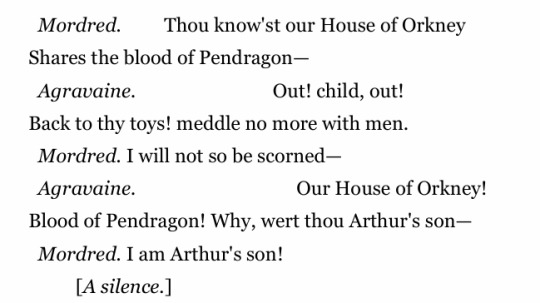
JAW DROP..... LIKE THIS SCENE WAS CRAZY. the earlier conversation where it was just them is top notch, and this kind of dynamic between agravaine and mordred is something i'd love to see more often.
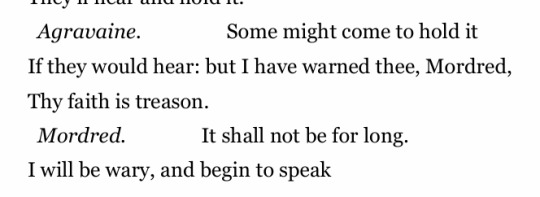
BIG fan of agravaine essentially being the logical/reasonable one between his brothers. i've compared him to dinadan because i think they're similar characters (except obviously agravaine isn't a jester/bard like he is) but they function similarly, in my opinion.
OTP
AGRAVAINE AND LAUREL 💖💖💖💖💖💖💖 i love them so so soso much it drives me insane. they're so perfect. i don't care that laurel is basically just a name in malory, i also love the HC that she's his lady love who (alongside a young mordred) takes care of him when he was suffering from a curse in vulgate.
admittedly i am biased to how i write them and how my peers write them (shoutout to @queer-ragnelle AGAIN lmao this is literally your fault)
nOTP
anything incestuous. looking at you TH White.
random headcanon
my favorite headcanon is that he's got some sort of facial scarring and he's blind in one eye. for me personally it's no reason just vibes, in my project he's got some kinda magic sigil under his eye (he can't see through it though obviously)

and like, obviously as a disability it affects how he fights. one of my favorite things about him in vulgate is comparing how he navigates battle and combat in comparison to his brother gawain, he's a lot more careful and discerning in his encounters rather than just going berserker mode. you can see this in agravaine vs druas the cruel, i think

vulgate lancelot part v
he knows his limits, lol
since i made him blind in one eye, he knows his blind spot and his weaknesses. (in my lore he's referred to as sir agravaine the one eyed swordsman for this reason) and he's a lot more calculating and cunning in his fighting style, more relying on wits + terrain (funny the guy with one eye is more observant than most people)
unpopular opinion
nothing i haven't said earlier. for whatever reason he has this reputation for being a crazy misogynist (likely thanks to Fate/grand order because of his infamous over meme'd to the oblivion line about hating women) and also again because of T.H White's depiction of him. and whatever the hell BBC Merlin did to him.
i just really hate that kind of depiction of him and honestly? there's worse characters. breuse sans pite's whole thing is being a rapist, and geraint/erec spends the entire time in his respective romances brutalizing his wife enid.
free my man agravaine he doesn't deserve this slander 😭or at the very least, i would like to have more nuanced portrayals of him for variety.
favorite picture of them
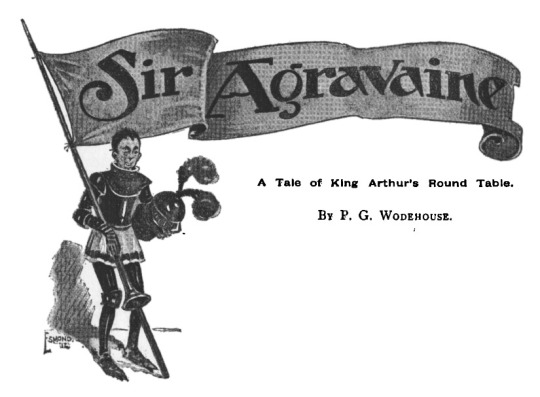
really love this image of him from the short story by P.G Wodehouse. really cute short story about agravaine!!
#agravaine#sir agravaine#arthuriana#arthurian mythology#arthurian literature#knights of the round table#ask#sorry i'm super behind/slow on these lol#lady laurel#my art
36 notes
·
View notes
Note
Hello, I hope you see mine lol but anyway here is my chart.


Hello, thanks for participating.
Your divine archetype:
⛰🌸🥀The passive maiden and silently powerful ruler⚔🦉👑
Your Goddesses:
Blodeuwedd_ Welsh flower goddess. Blodeuwedd means "flower faced". She was created specifically for a hero in Celtic mythology_ Lleu Llaw Gyffes, to be his bride and to ensure his kingship.
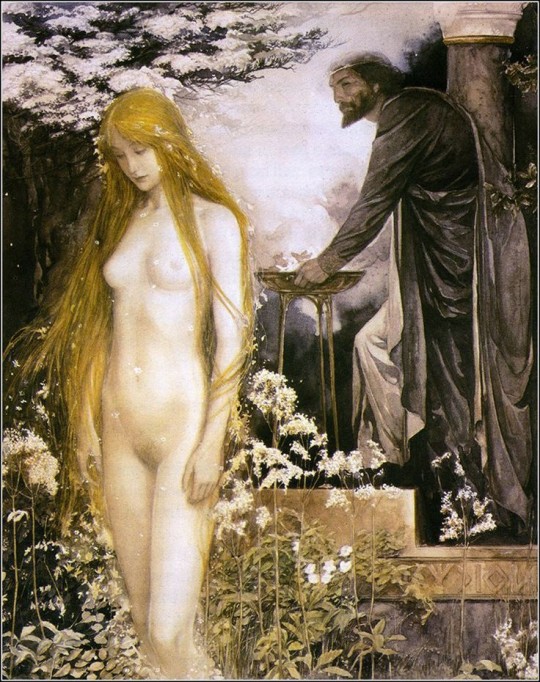
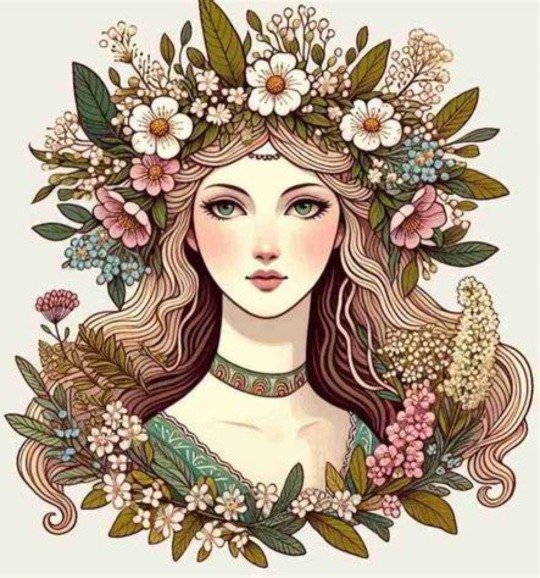
The main association she has to your chart would be your moon, which is the most important placement in every chart, in Rohini nakshatra. Rohini is fully in Taurus, it's the first moon-ruled nakshatra associated with the most unaware of passive feminine energy in its initial state. It's also connected to flowers. Rohini's power is to grow, like how toddlers start to grow in size as they absorb the world around them. Taurus rules the 2nd house naturally, but in your case it's actually in the 2nd house too, amplifying its effect. Moon is exalted in Taurus(in Krittika, but Rohini is also a good placement for it).
Rohini nakshatra is associated with such stories of women being created as grown adults with a specific intent and while being the object of desire. It's the unaware, submissive feminine.
All of your big three nakshatras have a theme of feminine passivity but in different ways. I just touched on Rohini.
Bharani is the mother nature, the discerning maiden, the embodyment of femininity in general, the yoni that purely reflects any impression made on it. It's Venusian, sexual, powerful and raw. Unlike lunar Rohini though, it's not about limitless enjoyment, but about the perfection of creation, enjoyment, being and the immortality of love, desire and venusian attachments.
Uttara Bhadrapada_ the warrior star, is a Piscean, watery, Saturn nakshatra that conquers and rules through obedience. Its perfection is achieved through cold precision and strength cultivated over time. Both Uttara Bhadrapada and Bharani relate to the immortality of the soul and can be viewed as nakshatras of sovereignty or honor. Rohini, being also passive, adds influence to the archetype that I'm about to bring up.
The sovereignty Goddesses are common in Celtic mythology. They largely relate to Bharani, but a lot of them are connected to Earth, making them also fit for your Rohini moon. They are also connected to granting rulership(Bharani and to some degree, Uttara Bhadrapada coorelation), while Bharani and Rohini both relate to being "the emboyment" that these goddesses are, the first nakshatra being the embodyment of desire, karma and universal law and the latter bring the embodyment of creative masculine energy manifested as a woman. They both relate to desire.
Goddess Gwehwyfar_ Arthurian Guinevere, is a sovereignty goddess representing the land of Albion(England). That's why anyone who wanted to rule in Camelot had to wed her. She's mostly resonant to Bharani but also fitting for Earthy passive Rohini and also passive, quietly powerful Uttara Bhadrapada. Her myths mainly focus on her marriage to King Arthur and later, her affair with Lancelot which led to the downfall of Camelot. Arthurian legends have many versions and different authors have added different stories throughout centuries, but Guinevere has remained a passive but crucial mythological character.
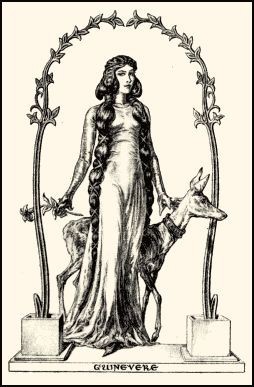
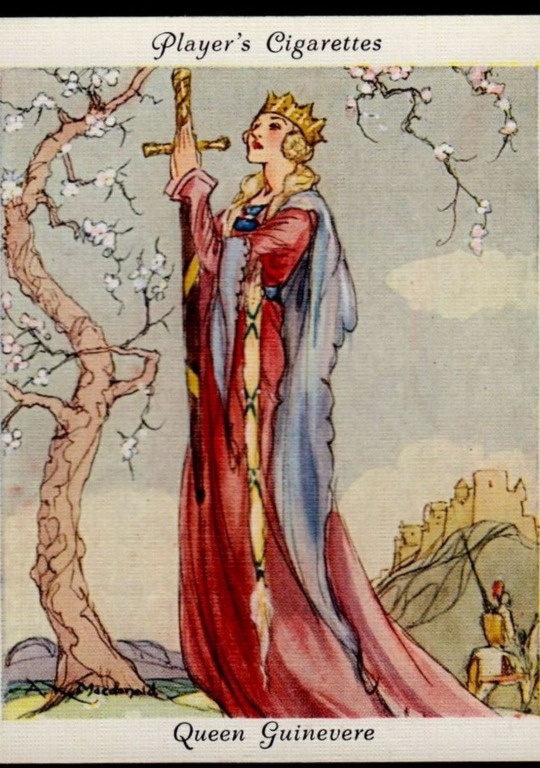
As an addition, I want to mention a few goddesses associated with Uttara Bhadrapada. Frigga_ Norse goddess of motherhood, love, nurture and fate. She's the consort of the highest standing Norse God_ the allfather Odin. Her silent knowing, power and associations birthing/motherhood makes her associated not with just Uttara Bhadrapada, but also with Bharani.
The same can be said about Greek goddess Psyche_ a human who was elevated to the status of a deity because of her love for Cupid. She relates to the purity of the soul, a theme found within both Bharani and Uttara Bhadrapada. Her butterfly/flying symbolism is related to Uttara Bhadra and the story of her myth is overall connected to it, but the aspect of her "elevating to another world" because of love can be connected to Bharani. According to Vedic texts, the result of Bharani is "moving on to another world", and its association with the power of love is prominent and quite famous in astrology.

I'm going to move on to Venusian Goddesses that also resonate to other parts of your chart than your big three.
Rohini is in Venusian Taurus, you have Ketu in Purva Phalguni, you obviously also have Venusian Bharani as ascendant but Bharani's rashi(Aries) lord(your chart ruler) is Mars(active version of it) and it's exalted in Martian Dhanishta in the 10th house which is the "best" possible nakshatra, sign and house placement for it. It affects visibility and makes the planet noticable to say the least. That's for an aspect of fierceness and passion to you that when mixed with Venusian influences, creates a very unique archetype.
Freya_ Norse goddess of love, passion, sensuality, war and chooser of slain. She is known for her radiant and passionate nature. This is the goddess that I associate with Bharani, but it can also definitely be associated to Purva Phalguni_ your Ketu, located in your 5th house of enjoyment and passion.
As the chooser of the slain, Freya has the first pick with which of the brave warriors she takes in her heavenly land of Folkvangr, Odin has the second pick. There is an side to her that is connected to the dead which most Venusian Goddessed don't have. But another definitely does.
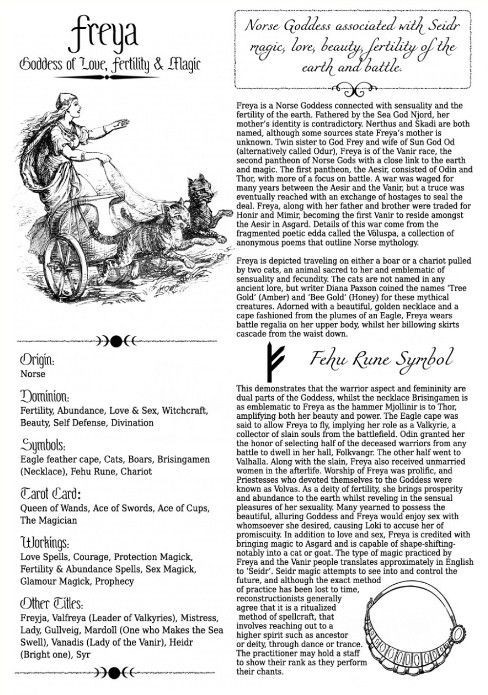
Inanna/Ishtar_ Mesopotamian Venusian Goddesses, often compared to each other, who descended into the underworld. Inanna went to the underworld to see her estranged sister_ Ereshkigal, who she was extremely afraid to see. You can research how her myth is told but an important symbol of hers is a lion. It was said that she is often mounted on one. Lion is Dhanishta's(your chart ruler's nakshatra) yoni animal. Her myth is about compassion, bravery, self-respect and power. She's called "the queen of heaven" and is associated with the evening star_ Venus.
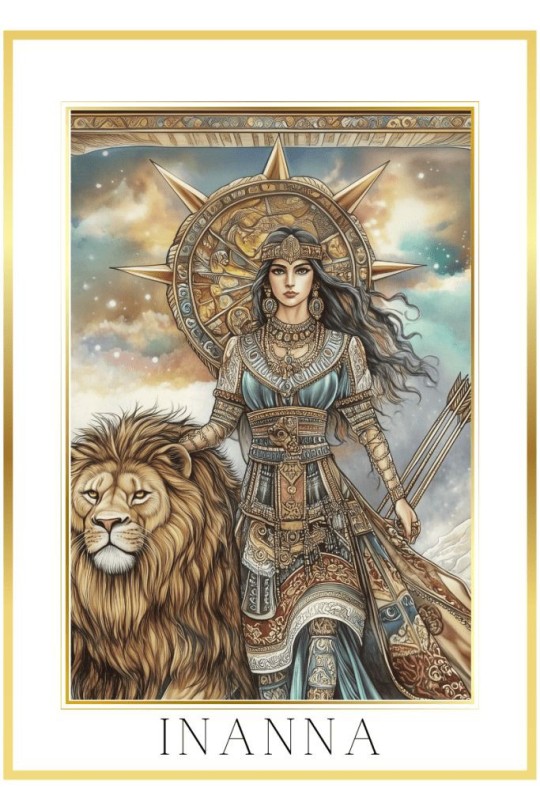
Another interesting part of your chart is Jupiter atmakaraka(the planet with the highest degree considered to represent the soul) in Jyeshta nakshatra. Jyeshta is fully in Scorpio(also a Martian sign) and in your case, it's also in the 8th house. First important detail to mention is that Bharani also has death associations, making your chart deep and intense, but secondly, and more importantly, it ties perfectly with and connects you again to Blodeuwedd.
Your moon is in Taurus, Rohini, second house. Your atmakaraka is in Scorpio, Jyeshta, 8th house. Both of these signs/houses/nakshatras deal with possessions and values in opposite ways. Rohini and Jyeshta are the two nakshatras connected to Blodeuwedd.
The goddess' symbol is an owl, Jyeshta's symbol, representing shrewd analysis and wisdom. It's also a protective force of nature.
The myth of why she is turned into an owl goes like this: One day her husband Lleu goes hunting. A young huntsman named Gronw comes ro her, seeking shelter, and he and the goddess experience love at first sight. He wanted to be with her so much that he persuaded her to kill Lleu.
They made the plan and Grown departs, leaving Blodeuwedd anxious about it coming together. Eventually, the prepare a bath on a riverbank with a thatched roof, so that it was neither indoors nor outdoors. As Lleu stood with one foot on the edge of the tub and the other on the back of the goat, Gronw threw a spear at him, hitting him on the side. Lleu turns into an eagle and flies off, surviving this attempt. He was discovered injured and nursed back to health by his cousins Math and Gwydion. The lovers are discovered and Gronw was killed. As to Blodeuwedd, she was turned into an owl_ a bird no other bird liked.
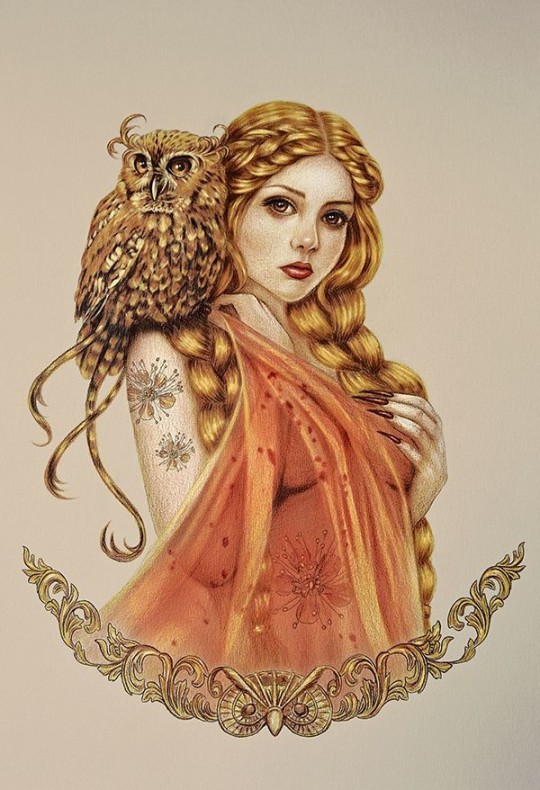

The goddess with no choice made one and was punished. This is the fate of the passive feminine, but her power is undeniable. Bharani relates to the struggle with free will, especially regarding love and independence, especially as a female/feminine, being power but not necessarily having it yourself. Rohini is the choiceless bride, while Jyeshta is the independent, wise woman, often seen as the protector of Rohini archetype. Blodeuwedd represents them both. Today, her name means "owl".
...
I hope this was informative and helpful.
Please leave a feedback in the asks after reading🤍 let me know if it resonated.
I still encourage you to research them yourself.
#vedic astrology#astrology#nakshatras#mythology#welsh mythology#celtic mythology#norse mythology#blodeuwedd#gwenhwyfar#guinevere#arthuriana#freya#frigg#psyche#inanna#ishtar#rohini#bharani#uttara bhadrapada#jyeshta#purva phalguni#dhanishta#moon#venus#mars#astrology observations#sidereal astrology#astrology tumblr#ask#goddesses
35 notes
·
View notes
Text
Just me, talking about the last battle of King Artoria Pendragon; the Battle of Camlann.
First, let’s say what sealed her fate. It was drawing the Sword from the Stone, Caliburn. Doing that made her King of Britain, but there was someone else that could have pulled that sword from the stone, Morgan la Fae, Artoria’s older sister. The moment Artoria became rightful King of Britain, Morgan’s jealousy took over, and she started planning her revenge. To that end, Morgan had five children : Agravain, Gawain, Gaheris, Gareth and Mordred. In the end, they all joined the Round Table; only Mordred technically staying faithful to Morgan.
Meanwhile, Lancelot and Guinevere are having an affair together (not right away), and they are quite good at keeping it secret. Unfortunately, Agravain finds them and alerts the others, and that’s the first thing that start making the Round Table crumble. Upon being found by Agravain, Lancelot kills him and gets exiled, while Guinevere gets condemned to execution.
Upon learning that, Lancelot decides to save her. In order to get her out of her cell though, he kills Gaheris and Gareth, the latter being his former esquire.
Meanwhile, Artoria has to go in campaign in former Rome to repell an invasion. Around that time, Avalon gets stolen by Morgan.
When Artoria comes back, she discovers that Mordred had taken over Camelot, and now Mordred’s army was marching on Artoria’s. In her way, however, stood her last brother, Gawain, and she killed him. The two armies fight their final battle, the Battle of Camlann, and they slaughter each other. In the end, on the top of a hill covered in corpses, with swords planted in the ground like graves, only Mordred and Artoria are still standing. Mordred, who had been denied being the King’s son, attacked her, and in the end, died when she was pierced by Rhongomyniad. However, Morgan had one last trick, having put a curse of rebellion on Mordred, and Mordred’s body acted on its own and swung the sword, mortally wounding Artoria.
Hopefully, if you knew about the Battle of Camlann, I taught you nothing up until now. Now, onto the more emotional part.
First, in Fate, Morgan is still alive in modern day. Can you imagine having to live so long with the despair of losing all five of your children? Yeah, me neither.
Also, Mordred never got what she wanted, which was to simply be the King’s son. She never even got to touch her.
Remember when I said drawing Caliburn from the Stone was what sealed Britain’s fate? That happened twenty years before the Battle of Camlann.
Of all the Knights of the Round Table, here are the ones who were alive at Camlann. Mordred, Artoria and Bedivere, though that last one is a technicality.
Also, for symbolism I probably don’t understand, there’s the fact that every knight who died at Camlann had a sword serving as a grave. Meanwhile, Artoria’s grave is Avalon, a sheath. Don’t know what that means, but it certainly means something.
Slightly off-topic, EMIYA also died on a hill with swords serving as graves.
Tag : @enemylv1
14 notes
·
View notes
Note
What’s your favorite Guinevere ? Whether in a movie/show or painting?
Hi anon!! Hope ur okie! Thank u for the ask 🥰🥰🥰 long answer because I can't shut the fuck up about Guinevere's ahhhh!!!
My fave Guin's are:

Jean Wallace in Sword of Lancelot (1963). She was married to the movie's director and writer, Cornel Wilde, who also starred as Lancelot. Also, they were also MARRIED AT THE TIME. She's incredible in the role ngl because her Guin is simultaneously cruel, bloodthirsty, lonely, sympathetic, loving, and funny and she's *screams* I think about her every damn day. Also, the costumes are STUNNING. Honestly, one of the best Guin's ever (and I love near enough any and all portrayals (apart from u fuck Mists of Avalon. I'm fuckin kicking you into a tar pit and setting you on fire. Also, Once and Future King's Guin. And also Gwen in BBC's Merlin. Angel Coulby is a brill actor and they give her NOTHING.)
In terms of tv shows? Tamsin Egerton in Camelot (2011)
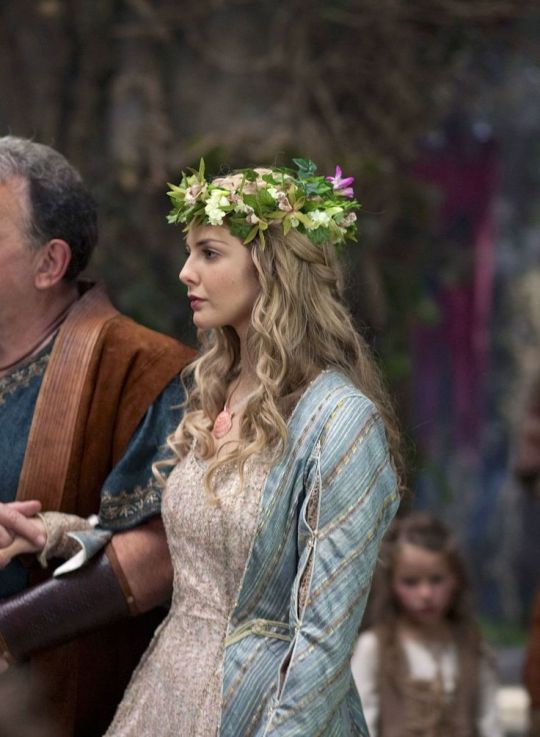
I love herrr!!!!! The show deserved a second series honestly because the way it reinvented so much of the mythos was really fun and Guinevere is an amazing character! I won't spoil if you haven't seen it but her and Arthur's relationship is super *screams* She's strong-willed, ambitious, but also offers Arthur a lot of support as he assumes his kingship. Plus, she's genuinely just a well-rounded character and I go *brrr* every time I think about her.
For art: Margaret Jones' illustration of Guin is !!!!!!!

(She's the red-headed lady in the blue dress sitting on Arthur's left. Sadly, this is about the best quality pic of the cover I could find.) Can u believe Margaret Jones only started illustrating when she was SIXTY?! I adore her work on The Thomases edition of The Mabinogion and I LOVE her art in this book too!!! Guinevere, beloved. (I do actually think of Guin as being a ginger.)
Also: John Collier's Queen Guinevere's Maying is probs thee quintessential depiction of her, but I swear to fuck, anon, I have a book on celtic myths I've had since I was nine or so, and this is in it in black and white. The hold it had on me is impossible to put into words.

Like baby girl is REGAL AS FUCK HOLDING THOSE BRANCHES. IMPOSING AS SHIT IN THAT GOWN. idk if its intentional but the vibe show gives off is very Rhiannon-ish to me. Maybe this is what partly influenced me to make Gwyn in my novel Rhiannon and Manawydan's foster daughter? Idk but I just love this painting sm!!!!!
(Also, in terms of books: GWYNHWYFAR IN GILLIAN BRADSHAW'S IN WINTER'S SHADOW UR MY BELOVED!!! Her pov is FASCINATING. While I dislike the fact Bradshaw chose to use Bedwyr in Lancelot' place for the affair - which doesn't really happen in Welsh Arthuriana so Gillian. Gillian, bls - I LOVE GWYN. Another ginger Guin, she's fuckin !!!!!! She tries to poison MEDRAWD AT A BANQUET!!!! SHE MARTIALS FORCES FOR ARTHUR! SHE MAKES ME GO INSANE.)
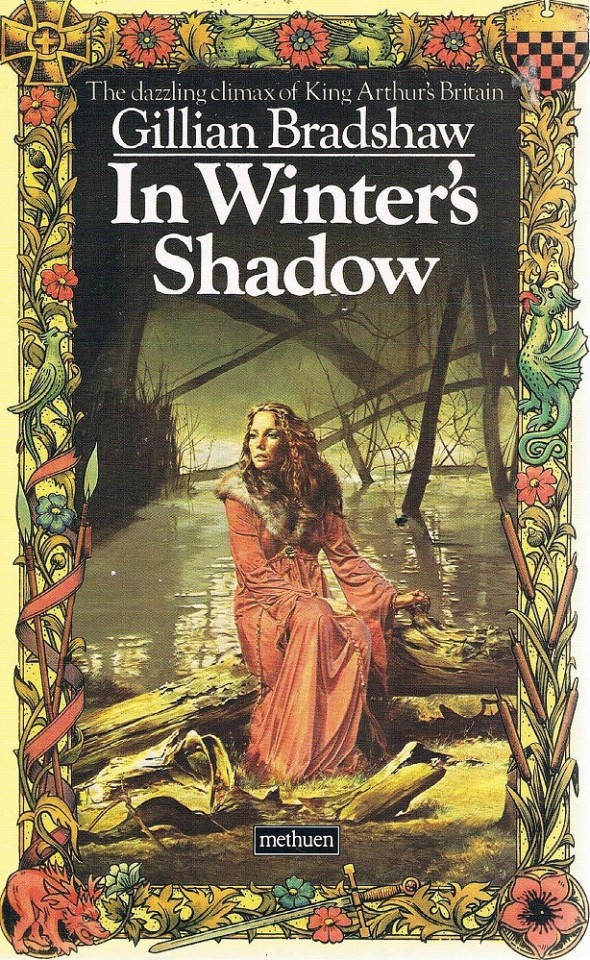
Also, okay this isn't a Guin piece of art but for me it evokes her and Arthur and it rattles around my head like a bullet on a daily basis:
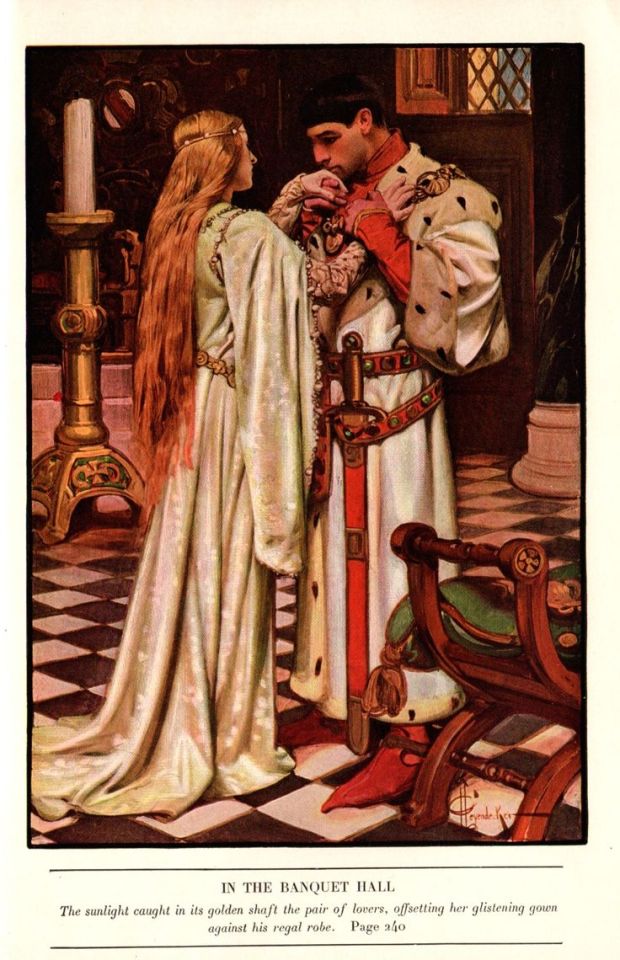
it's Joseph C. Leyendecker's illustration from a scene in Rodolfo. Peak Arthur and Guin to meeeeeeee.
Also, okay, one last thing: the poem Gwenhwyfar by Llew Llwyfo is INSANE, and also Aimee-Ffion Edwards portrayal of her in Albion - an audio drama - needs to be STUDIED. Plus, honourable mention in the book category goes to Cynan Jones' Blood, Bird, Snow where she legit appears to tell Cai off and I spent the entire time I was reading the passage internally chanting 'WIFE WIFE WIFE.'
okay, that's enough yapping. Sorry for the long answer, anon!!! 😭😭😭 I genuinely love Guin though. I'm so serious.
#arthuriana#queen guinevere#gwenhwyfar ferch ogrfan fawr#arthurian mythology#arthurian legend#arthurian art#margaret jones#the mabinogion#welsh myth#mabinogion#arthur pendragon#arthurian#okay I should've restrained myself but wife. Just wife. Thank u anon for this
14 notes
·
View notes
Text
Once and Future Royalty
Just, stay with me on this one. I know its going to look crazy at the start, but trust me, I know where I'm going.
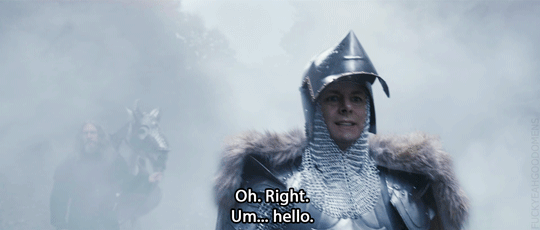
It all started with the 537AD scene in Wessex in the opening montage of "Hard Times," S1E3. Yeah, the one where Aziraphale is supposed to be a knight of the Round Table and Crowley is role-playing the Black Knight, and they are both so super-squeaky shiny clean - not a speck of dirt or mud on them. wtf! It looks out of place, unrealistic, and was bugging the crap out of me, like a stone in your shoe. It just didn't fit. I mean, why put a myth, a legend, into that sequence? Oh, OK, yeah, the preceding stories from the Bible, like the Garden of Eden and the Flood, aren't "myths" as well, you say? Hmm. In the context of the Good Omens AU, being a biblical based story, they belong there far more than the legend of King Arthur.
King Arthur, who supposedly united Britain under his rule during the late 5th century and early 6th century, was shown to have the divine right to rule by wielding the mighty sword Excalibur. Some stories tell of Arthur pulling Excalibur from a stone. Some tell of him receiving Excalibur from the Lady of the Lake. Either way, it was bestowed upon him by divine grace. Despite his triumph in battle, he left no heirs, as his queen, the fair Guinevere, was barren. She had a long-running love affair with the greatest knight of the court, Sir Lancelot, but despite this being an open secret in court Arthur would not put her aside. The knights of the Round Table in the court of Camelot were near-paragons of Christian virtue, and there are many tales of their search for the Holy Grail, the cup from the Last Supper of Jesus Christ.
In the end, mortally wounded in battle, Arthur was taken away for healing, and never seen again. It was said he would return when Britain was at it most direst hour to save the day once more. A "messianic" return.
The Once and Future King.
Now, I'm no Arthurian novice; I drank up all of T. H. White as a teenager, read the Dark is Rising multiple times, Marion Zimmer Bradley's interpretation and what ever else I could lay my hands on for a good couple of decades. And there is LOTS of King Arthur stuff around. You are not left wanting for anything new to read or consume. And I'll bet there are a fair few of you also out there who know a quite bit about the legend as well. Oh, and I can't tell you how many times I have watched Monty Python and the Holy Grail. I still walk around quoting it day-to-day, like the good little Gen-Xer I am, having grown up on that stuff. So I really should have listened to my intuition when bits of Monty Python kept popping up in my brain in response to other parts of GO I was thinking about. (Staaay, I said, stay with me here....)

I kept chewing away furiously on the Wessex problem, growling in feral frustration at it, but also kept reading and sorting out some other ideas and metas at the same time. Eventually I found the key in a tiny little post, about a small detail in the 1941 Blitz episode S2E4, of all places. I wanted to slap myself with how much was staring me in the face so obviously once the door opened. And the damn beauty of it is, that I already written about some it, out of context, without knowing the why.
OK. Where to start this journey...hmmm, back to Monty Python, because, guess what - the Wessex scene is actually riffing off one the more famous skits out the the Holy Grail. The scene is a masterpiece of political satire, from start to finish, but the relevant part here is this sequence:

In case you missed the salient points: Arthur claims he is king by divine providence, because he was given Excalibur by the Lady of the Lake. Dennis the peasant protests this waterlogged method of determination, mentioning ponds, watery tarts and a moistened... well, I hope you get the idea about where this is going.
Meanwhile, in 537AD, Wessex, as the mist swirls around them:

"It is a bit damp," complains a shiny silver Aziraphale.
Yes, Excalibur would be a bit damp after it emerged from the Lake. (vidavalor! Get your mind out of the gutter! I'm trying to have a serious discussion here! Please! And I wasn't even going to go anywhere near what the sword in the stone is really meant to be referring to...it's not even relevant to the discussion at hand, I swear! Well, there is going to be sexual relations mentioned but - oh, never mind...)
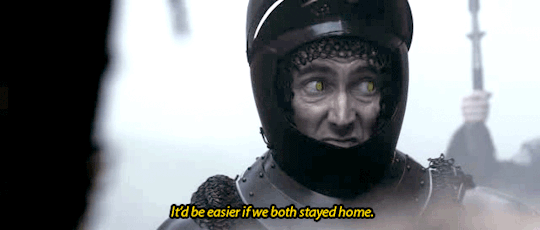
Right. Where were we. Lets leave those super-clean elite pretendy knights to swim off through the swirling mist back to their dry homes to write and file reports to head office, along with Patsy and the hired Igors, and Dennis can keep playing in his lovely muddy filth after he finishes protesting being repressed by the divinely-deluded Arthur. I've got a bit more to say about what Aziraphale and Crowley might represent here later but you need some more context first, so lets move on. I just needed to show you the first bit so you can see the Arthurian theme stretches across both S1 and S2, and will likely appear in S3 as well. More about that towards the end.
Ah, before I forget...another ref from the Holy Grail we need to cover:

This GIF, unfortunately, doesn't have the full exchange between the peasants, which is this:
P1: "Who's that then?" P2: "I don't know. Must be a king." P1: "How can you tell?" P2: "Because he doesn't have any shit on him."
Ah. Er. OH!
Have you made the connection?
Who have I been emphasizing as being unusually clean in their Arthurian setting? That's right, Aziraphale and Crowley.
What's this implying? That they are royalty. Celestial royalty. Maybe not kings, but how about princes? You know how we've been discussing whether Crowley was a once at least an Archangel, and there is even a hint that he was a fallen prince of Heaven given during the replay of Gabriel's trial? (Not the prince, but a prince - a seraphim) And that Aziraphale may have once been Raphael, and may be again in the future? Once and future royalty. To me it adds weight to the past discussion, and helps to explain the assumed authority expressed in these two scenes here: On the left, Aziraphale takes control inside the book shop as the angels and demons argue who is going to punish Gabriel and Beelzebub (finally found it after several months!) and on the right, Crowley is shouting at the assembling demons in the street that they are "out of order."

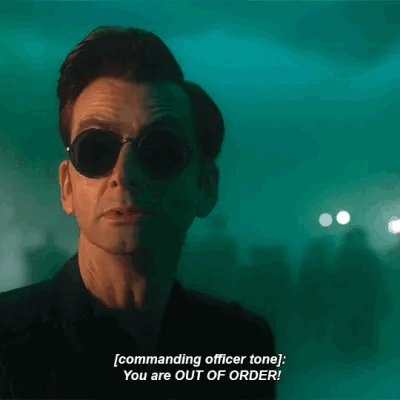
Onward, Patsy. (I hope you're still with me.)
1941, the Blitz part 2, minisode.
We've found Excalibur! On to Camelot!
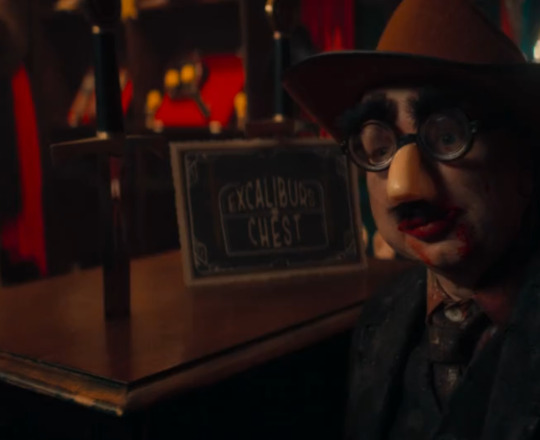
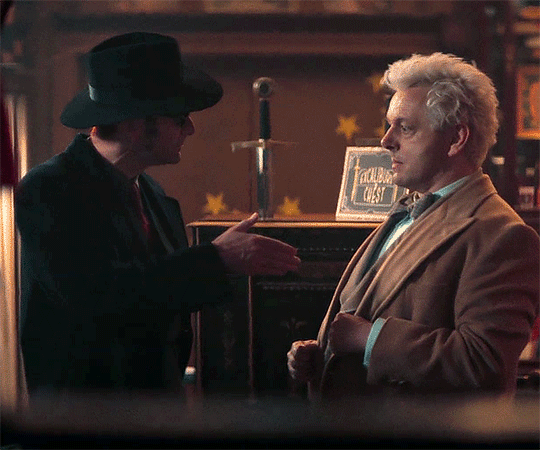
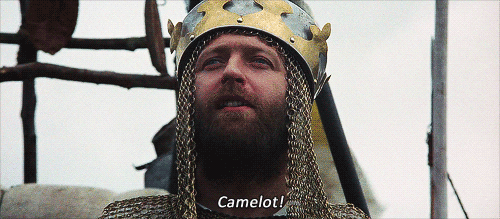
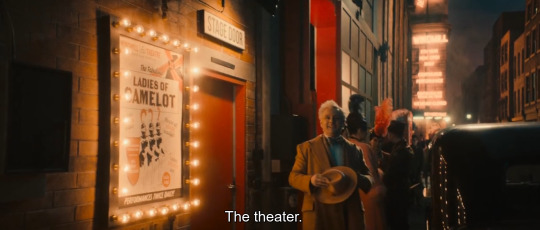

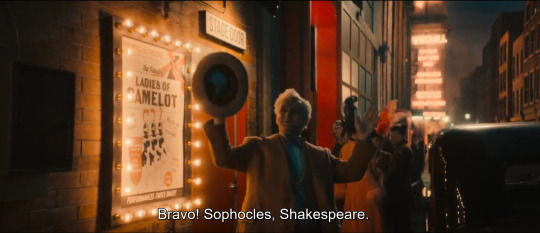
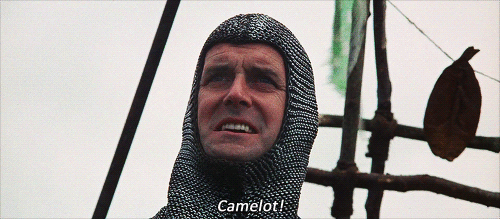


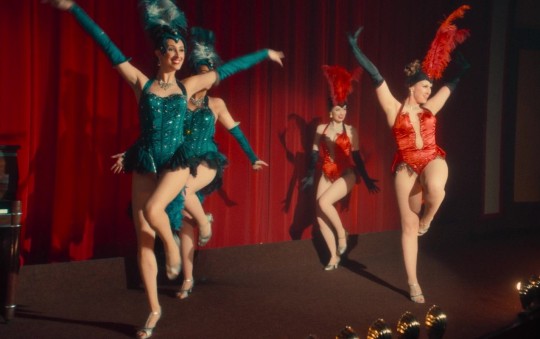

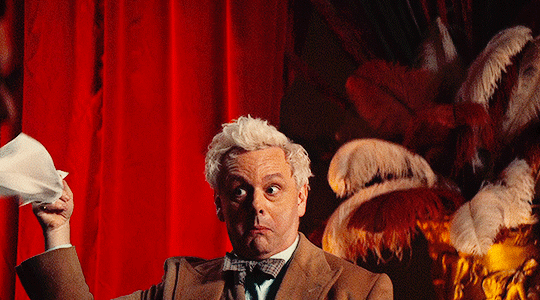
[Edit note: I've added a few GIFs and screen shots into the sequence of parallels above because I was thinking over a few things since I posted and felt this actually sat better. To try and explain, as they don't exactly match as I would like, in the Holy Grail movie, King Arthur and the knights he has gathered rock up at the foot of Camelot and gaze up in awe at it. "Camelot!" Arthur declares to the party. "Camelot!" Galahad echoes in excitement. And a third "Camelot!" comes from Lancelot. What do we get in GO? Aziraphale leaps out of the Bentley (Crowley's black horse) and declares "The theater! Sophocles! Shakespeare!" I swear, if you put the two side by side, they would match. It's not just a reminder of how much time Aziraphale has seen pass by, or that we are seeing a tragedy play out. But damn it, I could so just see Aziraphale attending a Sophocles performance in Athens back in the day...]
Camelot was King Arthur's castle and home of his court. In S2 of GO the Windmill Theater is established as our court of Camelot where our 1941 Blitz-era Arthurian drama is to play out, involving Furfur and the zombies.

Yes, poor old Furfur. Two's company, three's a crowd, as they say. Now we know we're in Camelot, we need to be reminded of the central tragedy of the Arthurian story, that ultimately led to the golden kingdom's fall. Lady Guinevere, Arthur's queen, famously loved Sir Lancelot, and the two were passionate lovers. It was essentially a love-triangle at the top, with Arthur being jilted, but he wouldn't/couldn't discard his queen. Where do we see this playing out in 1941?
Furfur, pleased with himself for catching an angel and a demon in the act of consorting together (with the help of the zombies,) barges into the backstage dressing room, and confronts the lovers with their crime. But who is playing who in the Arthurian love triangle? I would say Furfur is clearly caught in the role of Arthur here. Consider the following exchange:
FURFUR: Hmm, well, well, well… What have we here? AZIRAPHALE: Sorry, have we met? FURFUR: Oh, no, you never had the pleasure, but… we have, haven't we? CROWLEY: Have we? FURFUR: What do you mean "have we?" You know we have. We were in the same legion. Just before the Fall. Doing dubious battle on the plains of Heaven. Remember? CROWLEY: I remember going into battle, I don't remember being there with you. Sorry. FURFUR: I was right next to you. We did loads together. You use to jump on me back, little monkey in the waistcoat. Anyway, whether you do or whether you don't, it doesn't matter. I'm here to inform you, as a representative of the Higher Powers of Hell, that you, Crowley, are in breach of the Infernal Code. Consulting and collaborating with an angel, Fell the Marvelous, aka… [opens book] Azirapalala. Azirapapap. Aziphapalala. AZIRAPHALE: [annoyed] Aziraphale

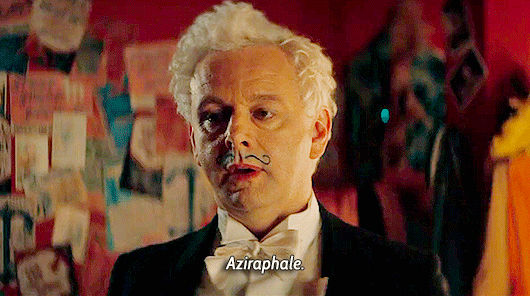
Furfur claims a past intimate relationship with Crowley, which Crowley spurns offhandedly. Crowley is playing Guinevere here, jilting Furfur/Arthur, which leaves the demon-smiting Aziraphale standing in for the handsome hero Lancelot (with his French connections, no less), and doesn't he make us weak at the knees when he drops his voice an octave in dominating disgust. (Is it suddenly getting hot in here...? Phew!)
Interestingly, looking back in S1 at 537AD Wessex, though, I would say that Crowley was Lancelot as the Black Knight, a role that Lancelot sometimes played in the legends, and Aziraphale would then be the fair maiden Guinevere. It certainly plays into Crowley's long term role of playing the knight who comes to the rescue of Aziraphale's princess in distress. Excalibur was no where in sight, perhaps still beneath the waters of the lake. Nor Arthur. Perhaps it was still too early in the story then...
I had originally suggested in my very first post that Furfur was given a stag as his demon avatar because he was wearing horns for being cuckolded by Crowley. But I wasn't quite thinking about it in context with the Arthurian legend! The stag is also often associated with royalty, plus while wandering around the medieval bestiary website that someone linked to, it interestingly notes that the enemy of the snake is the stag and the stork (Shax's avatar.) Ah ha!
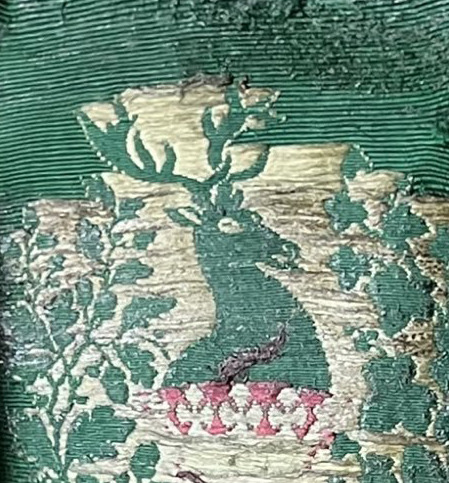
So how can we extrapolate this knowledge into a possible appearance of the Arthurian theme in S3?
Will we see the love triangle of Arthur/Guinevere/Lancelot come back into play and cause more chaos? I'm wondering if it might have something to do with the Fall.
Or will our lovers bring down a divinely-appointed ruler via their committed behind-the-back defiance of expected propriety?
Will Excalibur appear from beneath the waters, perhaps in another form, to declare a new king?
Could it even be a combination Jesus/Arthur, King of the World, returned? And they turn out to be a very naughty boy, disappearing into the night clubs of Times Square, New York, and that's how they lose him? (Social media viral sensation, anyone?)
I wouldn't be half-surprised if Greasy Johnson's name turns out to be Arthur, actually.
And no, I haven't forgotten that Adam's dad was named Arthur as well.
Bring on S3!
**Bonus**
If you've made it this far and you're thinking:

Let me leave you with this last connection.
In the back stage change room, remember Furfur delivers these lines:
FURFUR: What do you mean "have we?" You know we have. We were in the same legion. Just before the Fall. Doing dubious battle on the plains of Heaven. Remember?
On the first level, he is referring the Great War in the Good Omens AU.
On the second level, Furfur is paraphrasing Milton's Paradise Lost.
On a third level, I can (and will in a future meta) connect this back to the training initiative paintball fight at Tadfield Manor in S1.
And even deeper on a fourth level, if you do know the Holy Grail movie well, you'll remember there is an odd little subplot in it, that infers that the whole King Arthur and his knights thing is merely a full-on violent cosplay that is murderously rampaging across the countryside in the present day with the police in hot pursuit. It's a strange juxtaposition between reality and dream, and you aren't quite sure what it is real or not. The ending is bizarrely and abruptly surreal as the two story lines collide in the heat of battle, as the police turn up and arrest the combatants. A bit like this:
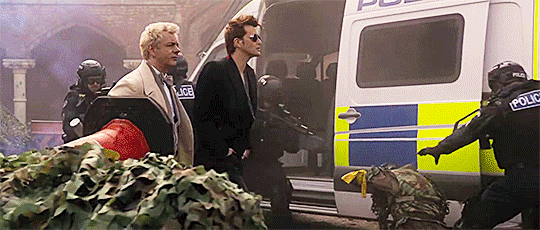
#good omens#good omens 2#good omens meta#good omens analysis#aziraphale#crowley#king arthur#king of the who?#the return of king arthur#excalibur#the lady of the lake#watery tarts#monty python#monty python and the holy grail#run away#camelot#arthurian legend#ladies of camelot#guinevere#lancelot#the once and future king#once and future royalty#good omens 1941#furfur#shax#dubious battle on the plains of heaven#tadfield manor
184 notes
·
View notes
Note
Hi! Sorry for the silly questions but i would like to ask you ,what are yoy fave relationships in Arthuriana and wht^ (romantic ,platonic ,bitter enemies ,familial etch)
Have a Good day !
Hi what a fun and delightful question !! Honestly if it’s done well I can pretty much get behind anything but I do have a few relationships that really make me go crazy in the best way:
Arthur and Morgan: people who don’t understand why a woman who seemed hellbent on destroying Arthur might also be the one to comfort him as he dies just. don’t get it. Like that’s her baby brother!!!you can spend your life scheming against him and coming up with silly goofy plans to undermine him but at the end of the day that is your baby brother. When Malory has her say « dear brother why have you tarried so long away from me? » HELP???
Morgan and Guinevere: just. Fascinating relationship. In the vulgate cycle Morgan starts to suspect that Guinevere is having an affair with lancelot when she spots his ring because Morgan has the SAME RING (with minor differences) and it was also a gift from Guinevere. I’m speechless. these monks really said that morgan and guinevere exchanged love tokens at one point. « We were girls together » or however it goes. like. so true. they were girls together!!!
Gawain and Guinevere: Camelot mean girls. Agents of chaos. Having little parties and gossiping. Guinevere riding out alone to meet him in the knight of the two swords and embracing him and covering his face with kisses because she is so happy to see him…thats (platonic) love baybee!
Gawain and Lancelot: i believe they loved each other. Like I really do. I’d go as far as to call them soulmates but in a sort of fundamental way I can’t quite explain. Gawain wants to be a woman so he can be with lancelot! Gawain asks Lancelot to kill him! Gawain is DEVOTED to that man. Very compelling.
Lancelot and Guinevere: fascinated by all iterations of their relationship. It’s so complex and interesting. Like the power dynamic is so rich, especially when you think of Lancelot’s ambiguous relationship with gender. They do love each other, even when it’s difficult and it looks like they don’t. Their final parting in Malory is SO painful to read.
I think what these all have in common is that they make me reflect on the nature of love and how complicated and interesting love is, in all its forms!
Thank you for your question <3 and if anyone want to tell me all about their fave arthurian relationships they can <3
(Edit: I also forgot to put Perceval and his mother on the list!! I am obsessed with them)
45 notes
·
View notes
Text
Read: Chretien de Troyes
As I've talked about before I'm finally venturing into ~Arthurian romance proper~, so I've been reading the more-or-less first big writer of those, and my god man can you stop getting sidetracked to gush about your oshi Gawain for like. five seconds. (yes we will TALK about his epic yaoi duel)
Since he doesn't have a Welsh origin I've not actually encountered Lancelot before but he's so funny here, I'm kind of obsessed with him. what a ditz. however I will restrain myself to talking about the stories in order:
Erec & Enide
Right from this first story, it turned out I was right in my estimation in that other post: this anachronistic exaggeration of high medieval feudalism works much better for me when it's not skewing a vague effort at depicting Romano-British history, and is instead producing a fascinating sea of bottle-world castles, forests, towns, fairs and bizarre creatures for our hero to wander and adventure through, in which everywhere works by its own strange rules and what's over the next hill might as well be (and often is) a foreign country.
It helps that I enjoyed this story a lot more than Geraint, the 'Mabinogion romance' based on it (and unlike the other Mabinogion romances, probably the influence goes mostly or entirely in that direction). There, he just comes off as some guy being a huge dick to his wife for the flimsiest of both possible reasons. Here, they both come off as being on some completely absurd courtly honour nonsense that's decently entertaining, especially since we're already primed for that kind of behaviour by the whole "as you know when we hunt the white stag the king has to bestow a kiss on the fairest lady in the court and they are all ready to stab each other to be nominated" episode.
Speaking of which, okay. can I say something weird. romance in this setting is all focused around courtly yearning, right? admiration of beauty, a glance, a blush, deigning to show favour, that in itself is effectively making love, yes?
okay so what the hell is THIS



In a world of gazing, yearning, courting...the queen?? the king?? all the knights?? this is like the courtly-love version of public-use kink. this is insane. to say nothing of this later:

yeah??? girls??? (okay a quick search of this site reveals I am not the only person to have noticed this. good for them)
Cligés
You'd think that this being about Byzantine characters I'd be all over it, and I certainly enjoyed it okay, but for some reason I find it hard to remember what the hell happens in it, especially the first half about Alexander. (checks) oh yeah it's Guinevere gently guiding two idiots into confessing.
What I do find interesting about this one is Chretien's changing attitudes towards Tristan and Iseult. In Erec, he references having written about them, and there's certainly an undercurrent that he's kind of over it--he keeps comparing his heroes favourably to them--but it's still at least on the surface in a laudatory way. Erec was even braver than noble Tristan!! But either due to his own attitudes hardening or as a response to audience reaction, by Cligés he's having his leads say "dear, we must do our illicit affair properly, or people will start to say we're just like that HARLOT Tristan! Can you imagine ANYTHING worse??" Like, all right, I get it.
Yvain
Now this makes an interesting read, having already read the Mabinogion's Owain, which--unlike with Geraint vs Erec--I think I enjoy both equally. Owain is much stronger in the first half. It's much clearer that the realm of the fountain is Otherworldly, and much clearer on the basic logistics of Owain getting stuck between the gates and Luned subsequently hiding him than Yvain is. That, and the opening with Cai going "come onnnn tell me a storyyyyy it's storytime and I want a STORYYYY" is just hilarious.
But Yvain shines in the second half; it makes much more deliberate use of the lion, and while Owain reasserting its subject's place in pseudohistory as Owain mab Urien, prince of Rheged, is interesting, it's all a bit of a rushed conclusion, while Yvain has a lot of really cool stuff, like, of course...


Gawain And Yvain's Epic Battle of Love and Hate. Okay BOYS
Chretien loves Gawain so much, it's so funny. Always calling him "my lord", always saying "well he could've solved the problem but he was busy that day so our hero will have to do it". Especially with his later reputation as Guy Who Does His Best But Is Distinctly Flawed. Which is interesting! Because that kind of degradation has already happened to Cai, who as established I like a whole lot.
So I kind of thought the "downgraded to mr fucks up constantly" Kay in these stories would make me sad and miss my special boy, but whoops, I remembered that I actually love the "guy who causes all the problems" character type! So he continues to be my fave! Tee hee
(There does also seem to be a hardening of Chretien's attitudes over time here too--in Erec Kay is overly brusque and gets knocked out, but he's genuinely trying to be helpful to someone he sees in need. By Yvain, every time he says anything someone, including the narrator, is just like "my guy can you stop being so RUDE")
Anyway, this story takes place at the same time as Lancelot, which it was indeed written alongside, so Gawain being absent for much of Yvain is because he's off doing the plot of Lancelot. Which is about to become very funny.
Lancelot
WHY DID NO-ONE TELL ME LANCELOT WAS A BIMBO
"do you mean himbo" no. that is a distinct kind of stupid. this man spent an entire encounter just zoned out, no thoughts, head empty, while this knight yells at him "HEY. STOP. I HAVE TO GUARD THIS RIVER. I WILL FIGHT YOU IF YOU COME IN THE RIVER. ARE YOU LISTENING. STOP. HELLO?" and he just trots on in completely oblivious, just not listening at all until the knight goes OK FINE and knocks him off his horse into the river
Lancelot: what the FUCK where am I who are you Knight: I challenged you like three times dude Lancelot: I was THINKING ABOUT STUFF (reaches up and executes a perfect wrestling hold and almost pulls his leg out of his socket)
like. I. the bit where they're trapped between two gates and he just chuckles like Heh...this must be some kind of mystical illusion. Don't worry lads, I'll get us out of this (dramatically reveals he was raised by a fairy and she gave him a magic ring that dispels illusions) (it turns out this is not an illusion and they're just trapped between two real gates) ok nvm

I can't just recount the whole plot but. cutting a guy's head off because a pretty girl told him to. the queen calling out to him mid-fight so he'll see her and be fuelled by the power of Love but failing to consider she's behind him so he spends the next part of the fight backhanding the shit out of this guy while facing the other way so he can look at her. this AIRHEAD
To go back to what I said about Gawain, it's absolutely hilarious that Yvain says he was busy on a noble quest with Lancelot so couldn't help out with all that, and then in Lancelot that amounts to the two of them split up to enter the enemy kingdom by two roads and each has to cross a river, and then Gawain...vanishes from the story. For weeks. And they finally go back and look for him and he is floating face-down in the river. Failed to cross it I guess?? They literally fish him out with sticks...
Anyway. I think it's interesting Lancelot escapes a tower with a pickaxe near the end, because this is a reworking of the older, mostly-lost story of Gwenhwyfar's abduction by Melwas, right, and a depiction of that, the Modena archivolt, shows one of the defenders as an unarmoured man with a pickaxe. Interesting piece of the puzzle!
Perceval
It's interesting that this is unfinished when it's already way long for one of Chretien's romances...and also that this is the one that so captivated the medieval audience's imagination. They couldn't get enough of it. So many continuations, attempts to finish it, reworkings, retellings...I mean, that is the essence of the 'Grail' idea, right, the endless quest for transcendental mystery and perfection. It inherently resists completion.
For the record, I don't even know how to compare this to Peredur. It is notable that that story changes the framing of his mom's advice--making it kind of weird advice to begin with that you could still interpret charitably, but the naive Peredur follows the letter and not the spirit; while in Perceval it's perfectly sensible advice but he just wasn't listening so he follows a half-garbled version of it. And if, as Killings & Widger's edition argues, the castle Perceval comes to rule is meant to be a kingdom of the dead, played down or partially-understood in its transmission from a lost Welsh or Breton source, you'd expect Peredur to add that back in like Owain with its Otherworldly fountain-realm, but it extremely doesn't.
It is incredibly funny that, once again, the reason we never finish Perceval's story is because Chretien couldn't resist taking a 3,000 line detour about Gawain's adventures in Everyone Hates You Land.
Special shoutout to this girl who starts following him around with a like. Knight humiliation kink???
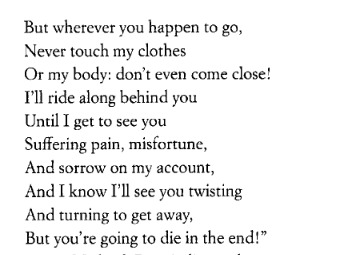
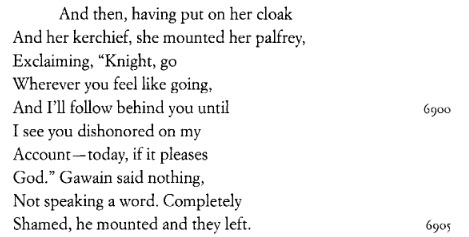
She gets way hornier than this about but I can't be bothered to explain the context for most of it, except that we do need to talk about this section:
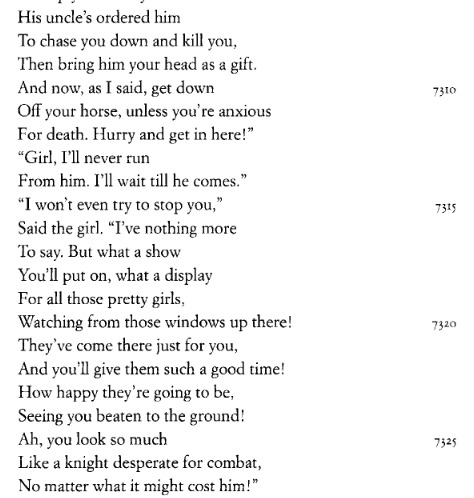
Because we have come FULL CIRCLE to that stuff I said about Enide near the start! Like, this is genuinely interesting to me--in Chretien's first romance we have all this charged delighted Attention on the lady being raised up to splendour and beauty, and in his last we have all this charged delighted Attention on the knight being broken down into shame and humiliation. There's something here.
Gawain spends most of this subplot with people mysteriously accusing him of various increasingly absurd crimes and riding around trying to clear his name so it's also very funny when this one guy is like "it's you! The motherfucker who made me eat dog food for a month!" and he's like. Oh I did do that one lol
Anyway, Perceval has some interesting gender, to me,
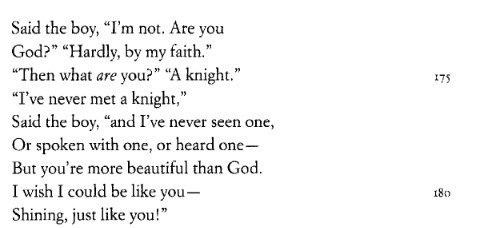
I dunno, this line just really stuck in my head.
I will say for one of these romances, not having the ending is way more consequential than for a lot of stories. Chretien loves to set up a bunch of mysterious characters and situations (very reminiscent of an RPG character running around picking up and resolving a bunch of different sidequests in random order) and then connect and explain them all at once at the end to produce a cohesive conclusion. So not having the ending means so much is left unexplained and mysterious! Hell, the Grail (and the accompanying lance) here isn't even explained, the Jesus backstory comes in from later writers; it's holy in some way, but who knows. Is it an adaptation of the severed head from Peredur, or the other way around? Who knows! And that exact ambiguity is presumably part of why the Grail story stuck in the popular imagination from the 12th century through to today.
Perceval goes questing, questing on, ever on...
7 notes
·
View notes
Text
Common Legend Deviations!
I had a 24 hour shift at work and I was, naturally, thinking about the Arthurians, mainly common legend themes/tropes that are not applicable to my versions of the Arthurians! So, here those are!

Arthur - Like, I feel like my bit for this is pretty obvious, as it is pretty much a defining point of how I write the general setting of Camelot. Arthur is hella bi and in a polyamorous relationship with both Guinevere and Lancelot. The relationship with Lancelot started BEFORE he married Guinevere.

Galahad - Galahad was raised by nuns in a convent with little to no relationship with his mother.

Gawain - Gawain is the eldest of his brothers (Agravain, Gareth, Gaheris, and Mordred) and is fiercely loyal to his family and his kingdom. He pleaded with his father when Lot fought against Arthur.

Guinevere - See Arthur. Guinevere was the one that was brought into the "affair" Arthur was having with Lancelot.

Gwenhwyfach - Gwenhwyfach is three years younger than Guinevere, and she was convinced by the conspirators that Guinevere DID NOT want to marry Arthur, which is why she went along with the False Guinevere Plot. She wanted to save her sister, not harm her.

Isolde - I HATE the love potion and I will only use it with HEAVY plotting. This is because I hate robbing their affair of agency. It just isn't as compelling to me as them genuinely falling in love to such a degree that they feel they have to be together even when it is a betrayal of Isolde's husband/Tristan's uncle.

Kay - Kay NEVER tried to claim that he was the one that pulled Excalibur. Did he try? Yes, they'd gone to London to have Kay try to pull the sword, as Arthur was still deemed too young. But when Arthur did pull the sword, Kay immediately supported him, and would have been the first to swear fealty to Arthur as king if Gawain hadn't pushed him out of the way to do it first (which Kay never forgives him for)

Lancelot - Same as Guinevere and Arthur. Lancelot and Arthur started their affair during the war at the beginning of Arthur's reign, before he married Guinevere.

Merlin - Merlin is nearly immortal, so he never really gets to the bearded old man stage unless he decides to appear that way.

Mordred - Mordred didn't go to war with Arthur because he hated Arthur or Camelot. A lot of it had to do with the lackluster response to Galahad's death (or failure to return from the grail quest at least). His grief fueled his belief that Camelot had become corrupt.

Morgan - Morgan was not Mordred's mother. She also didn't outright hate Arthur. She went through phases of working with Arthur and working against him. Morgan is the youngest of the sisters (Morgause the oldest, Elaine the middle sister) and is closest in age to Arthur.

Ragnelle - She didn't die five years after her marriage to Gawain, she outlived him as queen of Lothian and Orkney. She was also a Saxon commoner.

Viviane - Alright so this one is one of the more flexible ones, but Viviane is the overall ruler of Avalon. She does not pass on that title or relinquish her guardianship over the holy isle. She and Merlin were lovers, but that didn't stop her from stealing his magic and sealing him within a tree.
7 notes
·
View notes
Text
On Arthur #1.

Arthur never wanted to be King. He pulled Caliburn from the stone in a moment of childish naivety after Kay forgot his own sword; Arthur saw it and thought he would give it a try; he pulled it easily and then sprinted back to Kay with the sword of selection in his hand before the baffled look of everyone nearby. After years of traveling along Kay as errant knights and making himself a name as the wielder of the sword of selection, he was approached by the King's mage, (back then) a beautiful lady named Merlin Ambrosia, who informed him King Uther would like to meet them. Once at Camelot, the truth of his parentage was revealed in a public way so that he could not step away from the throne. He was basically tricked into it.
He really dislikes the positive connotations his name has nowadays. Even if there are more realistic depictions of his life out there, most people associates him with chivalry, justice, and righteousness, which rubs him the wrong way, as he was never a good person and is fully aware of it.
Connected to that, he's enraged about the treatment of Mordred in those same histories, as they paint him as the villain and cause of Camelot's fall. Arthur blames no one but himself, and Camelot was doomed long before any thought of treachery crossed Mordred's mind.
Due to the political situation of the kingdom Arthur was unable to publicly recognize Mordred as his son as he would have liked during his life, but he still did his best to step up as his father. He even went as far as to bestow upon him Excalibur as proof of his heritage, while Arthur himself held onto Rhongomyniad as his main armament. Excalibur then, would become the sword that Mordred would use to end Arthur's life. But even then, to him Mordred was always a source of nothing but joy and happiness. His negative feelings are directed towards Morgan only. He will never stand for any kind of disrespect Mordred's way, no matter how their respective lives ended.
Which in Arthur's case, was mad and broken. Looking back now as a heroic spirit, he agrees with Mordred's decision to usurp him, as by that point in life Arthur was paranoid, violent, quick to anger, and would indiscriminately kill anyone who spoke against him. He was hanging by a thread, and the little mental stability he had was due to Bedivere's support.
His feelings for Merlin are very complicated, what started as an infatuation in his younger years soured into something ugly and resentful as an adult. Were he to meet them again, he wouldn't know whether to fall to his knees and beg for forgiveness or close his hands around their throat and break their neck. The latter, is something he attempted once already, and had to be forcefully pulled away from them.
He and Guinevere never got along, and it's exclusively his fault. He was resentful due to being forced into a political marriage and took it out on her, being rude and cold and a sorry excuse of an husband to the point any hope of even just a friendship was smothered. To make it worse, he had feelings for Lancelot that imploded once their affair was revealed, and sentenced her to be beheaded out of jealously and bitterness.
The one thing Arthur regrets the most from his life is Mordred's fate. He fought him with everything he had like a wild animal, and only came back into himself once he pierced him with Rhongomyniad. He cradled his son's body in his arms as he died, held him, apologized and cried for him to open his eyes. He had to be forcefully dragged away from the body by Bedivere. X.
Although severely injured, Arthur was not actively dying from his wounds after Camlann. He could have survived, but after killing Mordred he felt he had nothing to live for anymore. He begged Bedivere to return Excalibur to Vivian and let him die.
9 notes
·
View notes
Text
Anyone else exited for Knights of Guinevere?
Tw: blood (?), unaturally colored blood, spoilers.

I am super excited for the official trailer, pilot, just the show in general.
if i have to guess anything;
its probably a 'evil disneyland' situation due to the 'Meet the Princess at Park Planet' posters in one of the teasers.
The 'blue lung blues' poster lead me down a rabbit hole of googling what 'blue lungs' meant, i got 'respiratory or cardiovascular issues' as an answer. and since i know that lack of oxygen can make your skin and nails turn blue- her color scheme is much more unsettling now.
when listening to the trailer i swear i heard 'oh shit she's waking up, Paige hold her down!' and i think the one with the ponytail is Paige.
based on the two scenes, fairytale & scifi-gore, i think its gonna be flipping between the 'perfect' world and the real world. a 'mind split between two world' type of thing. its likely the messed up cyborg body we saw was meant to be a real life version of the princess (how you wind up with a mangled cyborg with tentacle arms when trying to make a princess is beyond me) and they might be keeping her mind in that fantasy to keep her sedated & 'prepare' her for her 'live princess' role.
Or, and this might be a stretch: there is a parallel world along side the real one and the scientists who made the messed up cyborg are trying to pull someone from that world into the real one. and the cyborg is meant to be the vessel for the princess in the fantasy realm. a sort of: when she's asleep her mind goes to the 'real' world. and maybe there'll be a plot about severing the tie between the real world and the fantasy one? (again, may be a stretch)
of course the name is relative to king Arthur's wife; Guinevere. and probably a play on 'knights of the round table'. with that in mind, and the fantasy appearance of the starting scene, i think there's going to be some references to artherian legend. they're might be some kind of prince or king that's based off Arthur, and maybe a knight based off Lancelot (or the two are mushed into one character). probably some great wizard or otherwise magical person, and if there is a villain aside from whatever company's running 'park planet' it'll probably be based off Mordred or Morrigan the fay. both people who want to kill Arthur and Guinevere in the og story.
there's quiet a few knights of the round table, but the most notible are:
Lancelot- the one who has an affair with Guinevere, and was apparently some authors oc [watch this video for context]
Galehaut- a half giant who tried to overthrow arthur but becamed freinds with Lancelot instead [this video talks about it, and some of the other knights]
Dinadan- who's the resident comedian
Gawain- the boring one, except for the time he saved Arthurfrom getting his head cut off
Mordred- Arthur's illegitimate son who hates him & Guinevere
either way theres probably going to be a magic sword at some point.

#KoG#knights of guinevere#cw cussing#cw cursing#cw blood#cw cartoon blood#cw disney mention#cw eyes#tw blood#tw eyes#tw disney#theories#prediction#kog prediction#kog fanart#kog theories#my art#digital art
13 notes
·
View notes
Note
I wonder if there's a way to arrange the timeline so that you can have both the "Mordred is the son of Arthur and Morgause" and the "Galahad is the son of Lancelot and Elaine-as-Guinevere" plot points. Like, the Lancelot thing has to happen after Arthur is king, and the Mordred thing before, but both sons must be (young) adults by the time Arthur's reign ends, right? So they can't be born ten years apart.
Maybe it works if you push the whole "Arthur's reign begins / he marries Gwen / she has an affair" situation into 2-3 years, but I don't want them to all be teenagers for that whole story…
(I also like to imagine Arthur as older than Lance and Gwen, but I could give that up if I have to.)
If Mordred and Galahad have that parallel of being children of rape / deception, and they both have some weird prophecy hanging over their head, that makes a pretty cool dynamic. Especially given that they deal with it in basically opposite ways.
Hi!
Of course you can! I did it in my books. You can shift everything around however much you need to in order to tell the story you have in mind.
You’re not beholden to any “canon.” I love the Vulgate. She’s like a sister to me<3 You all know that. But the Vulgate timeline is not only extreme, but inconsistent. At the start, Mordred is older than Lancelot. Straight up a whole entire child before Lancelot is even conceived, which would also make Gawain a solid 20+ years older than Lancelot, and Galahad another 26-27years younger than that which is the age Lancelot sired him at in the Vulgate. So is Gawain in his 60s on Grail Quest? How old by the battle at Camlann? Dang, then Arthur must be a geezer…Whoa! Wild implications when you follow that through to the end. But then, somewhere in the middle of Prose Lancelot, before Mordred has learned of his true parentage, he travels around with Lancelot as a squire and has not yet been knighted. Lancelot there acts as a mentor figure to him, so their ages have reversed, and reflect what our modern viewpoint has come to consider “canon.”
So as I said, you can absolutely alter the timeline in any way imaginable if it benefits the story you want to tell. It’s going to take a lot of work. My suggestion is to pick a character as a focal point, Arthur perhaps (I used Gawain), set an age for them, and then determine approximately where you want everyone else to fall around them. You don’t have to stay specific in your actual writing, but knowing family member birth order and what life stages everyone is at will give you an idea of character dynamics and roles in society. (IE: Mordred and Galahad knighted around the same time, both approximately 18-21, while Lancelot and Gawain act as mentors/role models to them both, having been knighted about twice as long.)
It’s a lot of work, but once you get it all plotted out, it’ll make writing consistently much easier. Good luck!
#arthurian legend#arthurian legends#arthuriana#arthurian mythology#arthurian literature#sir mordred#mordred#sir galahad#galahad#writing#writblr#ask#anonymous
14 notes
·
View notes
Note
I saw an Elriel talking about how Elain and Azriel are going to have the best story because their "forbidden love" creates tension and obstacles, and they listed some other famous forbidden love couples. I don't remember/are familiar with all of the couples they mentioned, but some of them were: Romeo & Juliet, Antony and Cleopatra, Guinevere and Lancelot. They also brought up Titanic and Shakespeare in Love.
I get what they were trying to say. Forbidden love can make for an unforgettable and beautiful story, I'm not denying that, but looking at their list and seeing the couples I was familiar with, I could only think of one thing: Death.
Romeo & Juliet = dead
Antony and Cleopatra = dead
Guinevere and Lancelot = separated/try to atone for their affair/dead
Jack and Rose (Titanic) = Jack's dead
William and Viola (Shakespeare in love) = Viola is forced to marry someone else, and she and William are separated
Again, can forbidden love be fantastic? Yes. Can forbidden love have a happy ending? Yes. Does forbidden love typically have a happy ending? Not in my experience.
So, what exactly do Elriels want from this "forbidden love"? Apparently, they want it to start with Azriel defying Rhys and both he and Elain sneaking around, hiding and lying to their families because no one wants them to be together/happy. And then they want it to end, how? With Elain rejecting the bond, even though it's canon that she'd still feel it forever? With Lucien dying, even though death still doesn't make the bond go away and Elain will still feel it forever?
If Elriel happens and they do get the forbidden love treatment, it's not going to be a happily ever after. Either way, the ending is going to be bittersweet because Azriel and Elain are possibly going to damage their relationships with their families due to all the lying and sneaking around or Elain is going to end up with Azriel, forever feeling the bond.
Also, let's look at SJMs version of Forbidden Love: Dorian and Celaena - she broke it off because she knew a forbidden love was the wrong path to head down. Chaol and Celaena - They lasted for all of a week or so after he pined for her for months? Dorian and Sorscha - She ended up beheaded because of their forbidden love. The LoA and Helion - she ended up being physically abused by Beron and belittled because of her affair. Jesminda and Lucien - another beheading! We have a pattern here! Also, forbidden love tropes are usually because a parent or the one who holds their leash doesn't approve. Forbidden love where you're hiding it from the friends and family who actually care for you? There's nothing forbidden about that. That is just two people who haven't learned the art of communication and that makes them look foolish rather than romantic.
9 notes
·
View notes
Note
Ah someone else who has discovered the joys of Camelot (1967) a movie that I am completely normal about. Have you watched it? Because the delivery of the lines is everything and if you need someone to talk to about it I am, once again, completely normal about it. The scene where Lancelot and Arthur first meet?? A masterpiece in sharing a single braincell. And don't even get me started on the way Guenevere first treats Lancelot "have you jousted with humility lately". It's unapologetically at the top of my Arthuriana movie rank list and has gotten me to reread The Once and Future King
I have not watched the film yet!
I've been listening to the original cast recording on Spotify but, most importantly, I've read the book of the original Broadway production (1960 libretto) and I love it?? It's a delightful little read on its own, even without having watched the musical. (I want other people to read it please it's very funny I promise)
I guess the 1967 film script won't be identical to the libretto but I assume it's fairly similar.
The scene where Lancelot meets Arthur was hilarious it made me laugh out loud. Lancelot utter puzzlement ("Gone a-Maying, Your Majesty??"). Arthur's sudden self-consciousness.
And don't even get me started on the way Guenevere first treats Lancelot "have you jousted with humility lately"
I know!! Lancelot's grating self-righteousness coupled with his complete lack of self-awareness is so funny.
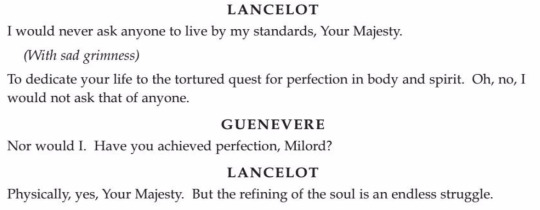


And I loved the gradual tone shift. It starts out so silly and the tragedy sneaks up on you — I thought Guinevere and Lancelot's affair might be played for laughs with an oblivious Arthur but no, it turns out he's fully aware of what's going on and he's forced to watch it unfold because he's powerless to stop it? and he loves them both and doesn't want any harm to come to them even as they betray him??
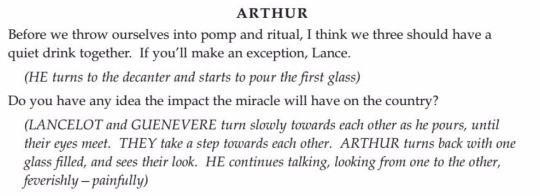
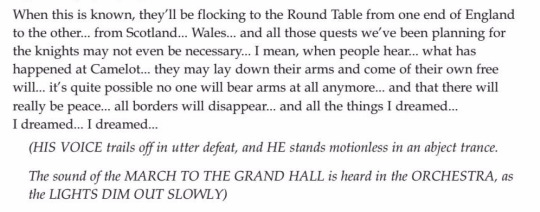
(He continues talking, looking from one to the other, feverishly — painfully) — Excuse me??
and King Pellinore is hilarious, he enters the scene wearing a monocle followed by a little mongrel named Horrid and talking like a character from a P. G. Wodehouse's novel. Extremely validating because when I read that chapter in Le Morte d'Arthur in which King Pellinore first makes an appearance my first question was "is he meant to be this funny?" and the answer from this script is a resounding YES.
I think I might perhaps watch the 1968 stage production first, merely because it's available for free on Youtube (at least in the UK).
I might try hunting for a free streaming link to the 1967 film, though I don't mind renting it if I can't find it.
#also the hawk motif got me ok#arthur asking merlyn to be turned into a hawk at the beginning#so he could spy on guinevere#telling merlyn he loved it when he turned him into a hawk that one time#arthur telling guinevere later that merlyn used to teach him lessons by turning him into different animals#and that he was meant to learn something from each one#but he didn't know what he was meant to learn from being a hawk#and then going 'oh no I got it!'#'when I was flying I could see there are no visible borders. why are we even making war to each other#over something that doesn't even exist. that's stupid. we are meant to live in peace'#'that was the lesson. I will create an era of peace'#and then his dream starts to crumble right before his eyes as lance and guinevere fall in love#and then him crying out to merlyn when guinevere was tied at the stake#asking merlyn to turn him into a hawk so he could fly away#like a lost child!! merlyn wasn't even there he hadn't been for years!!#I'm feeling so normal about it#sorry I just thought it was a good script!#regarding the songs – they didn't blow me away but I'm enjoying them!#they might grow on me still. probably more enjoyable when watching the film#I think my fave atm is Then You May Take Me to the Fair#“You'll pierce right through him?” “You'll open-wide him?”#GIRL why are you making it sound like that...#she's never been normal about lance not even for a minute not even at the start#asks#camelot (musical)
13 notes
·
View notes
Text
Is Lancelot a queer icon? A character analysis!
Hello noble readers, and buckle up for a long post. This time, we’ll be talking about Lancelot du Lake–arguably one of the most famous knights of the Round Table. Normally when we talk about Lancelot, we’re talking about his devout, somewhat insane love affair with Guinevere. But instead of that, we’re going to discuss a particular story in which Lancelot goes through some queering events. This post is about Sir Thomas Malory’s “The Noble Tale of Sir Launcelot du Lake”, and all the ways in which Lancelot is characterized as a queer character.
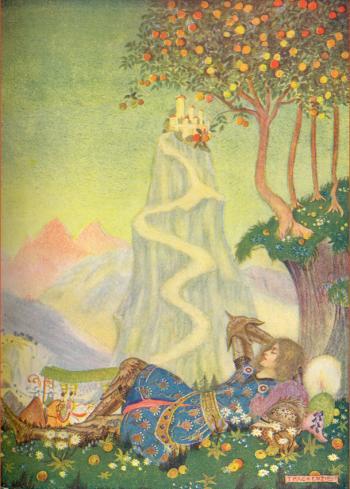
First up, we have to talk about the scene with the four queens in this story. If you’re unfamiliar with it, this is the part where Lancelot is just sleeping in the woods (???) and these four beautiful queens basically kidnap him, bring him to a castle chamber, and force him to take one of them as his lover. That’s not the weirdest thing to happen in medieval literature (looking at you, Wheel of Fortune), but the weirder part is Lancelot’s response. He says that he would rather die than choose one of them. Refusing women when they offer themselves to him is significant; he’s the most famous knight in the land but, time after time, he keeps on saying that he doesn’t want to take a wife or lover. An important side note here is that his relationship with Guinevere has not been established yet–in this story, he’s a single man! Lancelot choosing to reject all four of those beautiful, powerful queens is an important queer aspect of his character; he is alone and unattached even though he has the opportunity not to be.
This leads into our next point–Lancelot explaining why he doesn’t want a wife or even a paramour. He first says that all the rumors about him shacking up with Guinevere are completely false. Then, he adamantly states that a wife would only hold him back from participating in tournaments, jousts, battles, and adventures. He also says that having a paramour just feels wrong to him and would only make him a worse knight. Basically, Lancelot says a lot of not-so-nice things about women here; they’ll only hold him back, he’s stronger without them, etc. But if we combine that with his refusal earlier, the queer aspects of his character start to add up. He will actively refuse women over and over again because, unlike basically every other knight out there, he doesn’t see the need to have his own wife. It leaves him in a weird position; he isn’t acting like any of the other knights we so often read about–he isn’t even acting like the version of himself we’re familiar with from other iterations of Arthurian stories. In those, he is devoted to Guinevere; he fights battles for her, gives her presents, and constantly has to prove his love. Here, he’s a lone knight, wandering from battle to battle–his more significant interactions are with fellow knights, leaving women behind entirely.
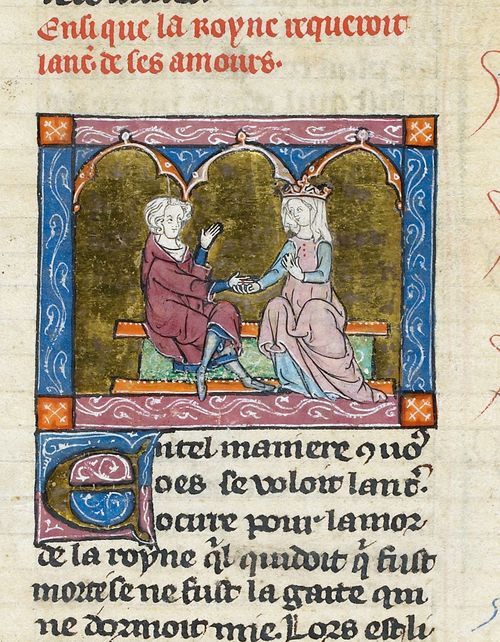
This leads into our final point about Lancelot’s queering in this story; his interactions with male characters! Towards the beginning of the story, Lancelot seeks shelter for the night in a random pavilion (basically a tent). Unbeknownst to him, the pavilion belongs to Sir Belleus, who misrecognizes Lancelot as his lady and starts to kiss him as Lancelot is sleeping! This one is just plain obvious; Lancelot was both misgendered and was kissed by another man. If that’s not a sign of literary queering, then I don’t know what is, so let’s move on. Later, Lancelot spends the night with Sir Kay–while their sharing of a bed may seem like queering, this was actually commonly done and totally nonsexual, so we’ll skip it. The more important part of this glorified sleepover is that Lancelot switches his armor, shield, and horse with Kay. These are all essential to masculinity, so sharing armor is a somewhat intimate thing. Based on what we've already seen with Lancelot, this level of trust and intimacy is something he doesn’t want with women and can thus only have with men.
So, we’ve talked about the queer aspects of Lancelot’s character in this story. He rejects women who offer themselves to him, hates the idea of being bound to a wife, and seems to have his closest relationships and interactions with men. It’s certainly different from the Guinevere-obsessed Lancelot we’re used to. Lancelot comes off as eccentric and even weird in this story–we didn’t even mention the part where he strips down to his underwear to climb up a tree. But since, in many other Arthurian stories, a knight’s masculinity seems to be supported by his lady, this separates Lancelot from others. In this story, at least, his gender construction doesn’t stay strictly within the binary and his motives and actions become harder to understand.
First image: Thomas Mackenzie, 1920
Second image: Miniature of Lancelot and Guinevere, north-eastern France or Flanders (St Omer or Tournai), 1316
#arthur pendragon#gawain#guenevere#king arthur#medieval literature#round table#lancelot#lancelot du lac#booklr#books#medieval art#medieval#middle ages#15th century#medieval history#historical#bookworm#book quotes#books & libraries#bookblr#reading#books and reading#book review#bookstagram#queer#queen#queer community
11 notes
·
View notes
Note
Rank your favorite LIs within your favorite stories. (i.e., rank the OH lis, BOLAS lis, etc.)
Hey Nonny,
Thank you for the ask! I want to preface that these are my opinions, and others have different opinions, and that's all right. I'll do this for all the Choices stories I've read (and remember! lol). But I'll start with the 2 multiple LI stories I write for first.
Open Heart
Tobias Carrick - I know he wasn't an LI, but it's not my fault PB is stupid! lol
Ethan Ramsey
Bryce Lahela
Jackie Varma
Raf Aveiro
Wake the Dead
Eli SIpes
Troy Hassan
Shannon Fox
Angel Savage
Sledge
More Below
A Courtesan of Rome
Cassius (from what I remember lol)
Sabina
Syphax (in fairness, I never completed the route with him)
Julius Ceasar (hated the fucker, but he was hot as hell lol)
Desire & Decorum
Ernest Sinclaire I really like all the other LIs, but I'm eternally devoted to Ernest. lol I've never been able to pick anyone else.
Foreign Affairs
Blaine Hayes (M and F Versions)
Tatum Mendoza
Ayna Seth
The Freshman Series
Zig Ortega (eternally devoted to Zig! lol)
Becca Davenport
James Ashton
Chris Powell
Kaitlin Liao
Guinevere
Tie. I loved Arthur and Lancelot, I can't pick! lol
Hot Couture
Marco Di Vincenzo
Luz Estrada
Hazel Nguyen
Travis McKenzie (really not my type...)
LoveHacks
Marc Collins
Ben Park
Leah Myers
My Two First Loves
Noah Harris (Bad Boy/Default) LOVE Noah
Ava Lawrence (Best Friend/Default)
Mason Jennings (Childhood Crush/Default) Really didn't care for him.
Perfect Match
Damian Nazario
Alana Kusuma (sorry, she's hot) Didn't romance others. Sloane irritated me, and Hayden... they're a robot. lol
Queen B
Ian Kingsley (Sorry, not sorry!) Didn't romance others, Zoey was too friend zoned for me, and Poppy, absofreakingloutely NOT.
Red Carpet Diaries * I'm only about 5 chapters in - so this is subject to change.
Matt Rodriguez Really don't know enough about the rest just yet. Teja's stupid hat ruined her for me.
The Royal Romance
Drake Walker (Sorry, curmudgeons with a soft spot for LI are my kryptonite)
Liam Rys
Hana Lee (Love her, but to quote Hozier, she's too sweet for me)
Maxwell Beaumont (he's totally friend-zoned for me)
Rules of Engagement
(I barely remember this story, but from what I recall:)
William (Business Guy)
Leo (Prince)
Dean (Bartender)
The Unexpected Heiress
John Somerset
Gemma Montjoy
Hugh Crawford
Veil of Secrets *
(I am 11 chapters in, but pretty confident with my choices here:)
Grant Emerson
Naomi Silverhawk
Flynn O'Malley
Kate O'Malley
I started BOLAS but didn't get far. Based on what I read, I would say:
Mal Volari
Nia Elarious
I'm too human-centric for Tyril or Imtura, and I never met the others.
Thanks for the ask, Nonny!
3 notes
·
View notes